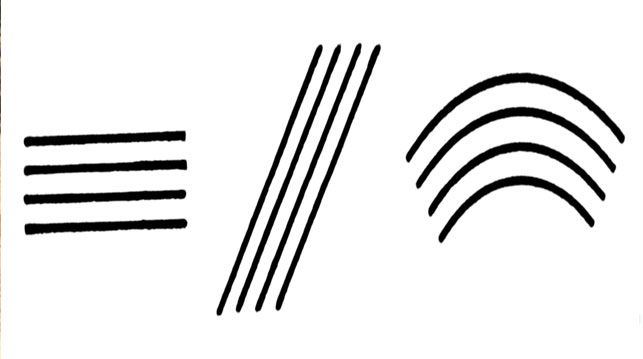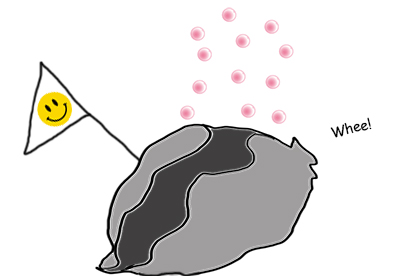
The English language allows us to fold, spindle, and mutilate sentences to suit our desire to make lists, desire to use long sentences, and love of PowerPoint presentations. However, to keep such documents from becoming gibberish, we must follow the law of parallelism.
In short, “parallelism” means the same parts of a sentence must be of the same type. But I’m not sure how helpful that is as a definition, so let’s take a slightly longer look through a few examples.
Shopping List
Let’s say we’re going to the store, so we make a list.
Bananas
Milk
Bread
Walnuts
Washing
We take this little list with us to the store, and it works great. We know that we mean food items for the first four entries and things like laundry soap and fabric softener for the fifth entry. We’re happy as clams.
Get a free sample proofread and edit for your parallelism.
Two professional proofreaders will proofread and edit your parallelism.
 But let’s say we can’t make it to the grocery, so we give the list to someone else, who takes it to the store. They walk down the aisles just fine until they hit that last entry: washing. Washing what? Is this a typo? Yes, all five words can be nouns, but you don’t go to the store to buy “washing.”
But let’s say we can’t make it to the grocery, so we give the list to someone else, who takes it to the store. They walk down the aisles just fine until they hit that last entry: washing. Washing what? Is this a typo? Yes, all five words can be nouns, but you don’t go to the store to buy “washing.”
What we needed to do was make sure all five entries are the same type of thing. “Washing” in this context is an adjective. Once the list was going to be used by someone else, we needed to make that entry “washing supplies,” or, better yet, “laundry soap” and “fabric softener.” Then the entries on the list would be parallel.
Long Sentences
English grammar is a fickle thing, but it can be your friend. Good parallelism helps you make sense with your long sentences by enforcing this idea that when you have lists of any kind, they must be the same type of thing and thus make sense to your reader.
Let’s start with this one:
I went to the store to buy bananas, milk, bread, walnuts, and washing.
This is what we call “bad parallelism” because “washing” is not in line with (parallel to) the other entries. Again, we can fix it:
I went to the store to buy bananas, milk, bread, walnuts, and washing supplies.
Now, let’s consider something a bit more complicated:
When the public health is concerned, personal freedoms must sometimes give way to the common good, common sense, and it’s for a common agenda.
Whoops. Can you see the bad parallelism?
Common good
Common sense
It’s for a common agenda
We have a modified noun, another modified noun, and a sentence (i.e., independent clause). That’s not going to work.
Another way to look at it is to see the word “to” as a sort of hook that the rest of the sentence must hang on.
When the public health is concerned, personal freedoms must sometimes give way to the common good. . .
When the public health is concerned, personal freedoms must sometimes give way to common sense. . .
When the public health is concerned, personal freedoms must sometimes give way to it’s for a common agenda.
Nope.
To fix it, we could break it up into two separate sentences, or we can just bring the third entry into parallel:
When the public health is concerned, personal freedoms must sometimes give way to the common good, common sense, and recognizing it’s for a common agenda.
Let’s do a couple more.
Proper oral health involves a daily regimen of brushing and flossing, going to the dentist every six months, or whenever you feel pain.
Yikes.
This sets itself up as a list and then sort of wanders around. Very bad parallelism:
Proper oral health involves a daily regimen of brushing and flossing. . .
Proper oral health involves going to the dentist every six months. . .
Proper oral health involves whenever you feel pain.
Nope.
To fix this, we must realize we have a list only of two actions. That third “entry” is a modifier.
Proper oral health involves a daily regimen of brushing and flossing and going to the dentist every six months or whenever you feel pain.
And how about:
I’ve given up on collecting stuff for money because people get so crazy for tiny little details about the dolls, the Star Wars films, some odd thing about a label, or something equally weird in a hermetically sealed box.
So here we have four entries, and they’re all nouns, but again “the Star Wars films” is not the same kind of thing as the others. The other three entries deal with the thing being collected, whereas “the Star Wars films” are not. To fix this, we must figure out what sort of stuff is being collected about the films that shows why I’ve given up on collecting it.
I’ve given up on collecting things for money because people get so crazy for tiny little details about the dolls, super-expensive junk from the Star Wars films, some odd thing about a label, or something equally weird in a hermetically sealed box.
Next time, parallelism and bullet lists!
Julia H.
Get a free sample proofread and edit for your parallelism.
Two professional proofreaders will proofread and edit your parallelism.
Get a free sample proofread and edit for your document.
Two professional proofreaders will proofread and edit your document.
We will get your free sample back in three to six hours!